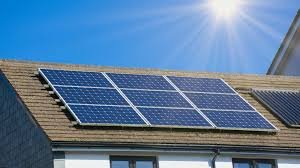Understanding Your Solar Energy Needs
Assessing Your Energy Consumption
Before diving into the world of solar energy, it’s crucial to understand your energy needs. Look at your past electricity bills to determine your average monthly consumption. This will help you gauge how much energy you need your solar system to produce.
Evaluating Your Roof’s Suitability
Not every roof is ideal for solar panels. Roof orientation, angle, shading, and structural integrity significantly impact the efficiency of your solar system. Conduct a thorough assessment or hire a professional to evaluate your roof’s suitability for solar panels.
Researching Solar Installers
Checking Credentials and Certifications
One of the first steps in choosing a solar installer is verifying their credentials. Seek certifications from reputable organizations like the North American Board of Certified Energy Practitioners (NABCEP). These certifications ensure the installer has met industry standards.
Reading Reviews and Testimonials
Customer reviews and testimonials offer valuable insights into the installer’s reliability and service quality. Check multiple review platforms for a balanced view of the company’s reputation.
Comparing Experience and Expertise
Experience matters when it comes to solar installation. An installer with a proven track record is more likely to handle potential issues efficiently. Compare the knowledge and expertise of different installers to find the best match for your needs.

Evaluating Solar Installation Costs
Understanding Cost Components
The cost of a solar installation includes the price of the panels, inverters, mounting hardware, labor, permits, and additional components. Understanding these cost components helps you make an informed decision.
Requesting Detailed Quotes
Request detailed quotes from multiple installers. A comprehensive quote should break down the costs, including equipment, labor, and any additional fees. This transparency helps you compare offers accurately.
Financing Options for Solar Installations
Paying Cash
Paying cash upfront for your solar installation is the simplest method and often results in the highest long-term savings. However, it demands a substantial upfront investment.
Solar Loans
Solar loans allow you to spread the cost of your installation over several years. These loans can be secured (home equity loans) or unsecured (personal loans). Compare interest rates and terms to identify the best option.
Solar Leases and Power Purchase Agreements (PPAs)
With a solar lease, you pay a fixed monthly fee to use the solar system, while with a PPA, you pay for the electricity generated. Both options require little to no upfront cost but typically offer lower long-term savings compared to owning your system.
Government Incentives and Rebates
Government incentives and rebates can significantly reduce the cost of your solar installation. Research federal, state, and local programs that offer financial incentives for solar energy adoption.

Evaluating Solar Power System Components and Performance
Types of Solar Panels
There are three primary types of solar panels: monocrystalline, polycrystalline, and thin-film. Monocrystalline panels are known for their high efficiency, although they do come with a higher price tag. Polycrystalline panels are less efficient but more affordable, while thin-film panels are lightweight and flexible but offer the lowest efficiency.
Inverter Options
The inverter is a crucial component of your solar system. There are different types of inverters available, including string inverters, microinverters, and power optimizers. Each has its pros and cons, so choose based on your specific needs and budget.
Warranties and Guarantees
Warranties are essential for protecting your investment. Look for comprehensive warranties that cover both the equipment and the installation work. Typically, solar panels come with a 25-year performance warranty and a 10-12-year product warranty.
Understanding the Installation Process
Site Assessment
A thorough site assessment by your installer is the first step. This includes evaluating your roof, shading, and other factors that could affect system performance.
Installation Timeline
The installation timeline varies but generally takes a few days to a few weeks. Ensure your installer provides a clear timeline and keeps you updated throughout the process.
Post-Installation Services
Post-installation services, such as system monitoring and maintenance, are crucial for the long-term performance of your solar panels. Choose an installer that offers robust post-installation support.

Comparing Solar Installer Proposals
Evaluating Price vs. Value
When comparing proposals, don’t just focus on the price. Evaluate the value you’re getting, including the quality of equipment, warranties, and the installer’s reputation.
Analyzing the Scope of Work
The scope of work should be clearly outlined in each proposal. Ensure it includes all necessary components and services to avoid unexpected costs.
Checking for Hidden Costs
Be wary of hidden costs such as permit fees, interconnection charges, or additional hardware. Clarify these with your installer before signing a contract.
Legal and Regulatory Considerations
Understanding Permits and Regulations
Solar installations require various permits and must comply with local regulations. Your installer should handle this paperwork, but it’s good to understand the requirements.
Navigating HOA Guidelines
If you live in a community with a homeowners association (HOA), check their guidelines regarding solar installations. Some HOAs have specific rules that you need to follow.
Customer Service and Support
Pre-Installation Support
Good customer service starts before installation. Your installer should provide clear communication, answer your questions, and guide you through the process.
Post-Installation Maintenance
Ongoing maintenance is vital for the longevity of your solar system. Choose an installer that offers comprehensive maintenance services, including regular inspections and cleaning.
Handling Complaints and Issues
Check how the installer handles complaints and issues. Having a customer service team that is responsive and proactive is a strong indication of a trustworthy company.
Long-term Considerations
Performance Monitoring
Performance monitoring systems track your solar panel’s output and alert you to any issues. Ensure your installer provides a reliable monitoring solution.
Maintenance and Repairs
Ensuring regular maintenance and timely repairs is essential for achieving optimal performance. Choose an installer that offers these services as part of their package.
Upgrading Your System
Technology evolves, and you might want to upgrade your system in the future. Discuss the potential for upgrades with your installer.
Making the Final Decision
Weighing Pros and Cons
Weigh the pros and cons of each installer and financing option. Consider factors like cost, quality, customer service, and long-term benefits.
Trusting Your Instincts
Trust your instincts. If something feels off about an installer or financing option, it’s worth exploring other options.
Conclusion
How to choose a solar installer to finance can be daunting, but with careful research and consideration, you can make an informed decision that suits your needs. Embrace the benefits of solar energy and take a step towards a sustainable future.
FAQs
What Should I Look for in a Solar Installer?
Look for certifications, experience, customer reviews, and a comprehensive service package. Verify their credentials and ask for detailed quotes.
How Do Solar Leases and PPAs Work?
In a solar lease, you pay a fixed monthly fee to use the system. With a PPA, you pay for the electricity generated. Both options typically require little to no upfront cost.
Are There Government Incentives for Solar Installations?
Yes, there are various federal, state, and local incentives and rebates available to reduce the cost of solar installations. Research the programs available in your area.
How Long Does a Solar Installation Take?
The installation process can take from a few days to several weeks, depending on the project’s complexity and permitting requirements.
What Happens If My Solar Panels Need Repairs?
Choose an installer that offers robust post-installation support, including maintenance and repair services. Ensure they provide warranties that cover potential issues.










